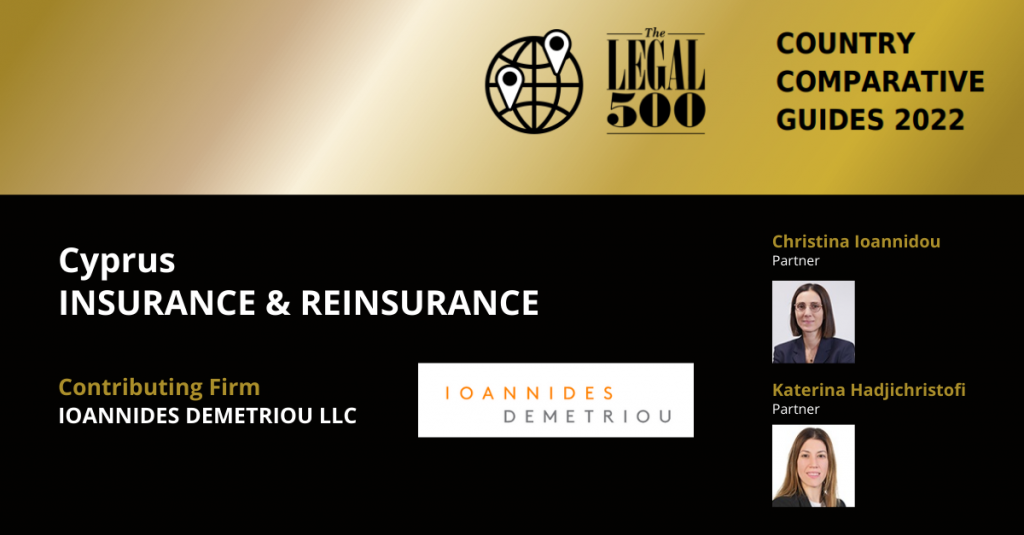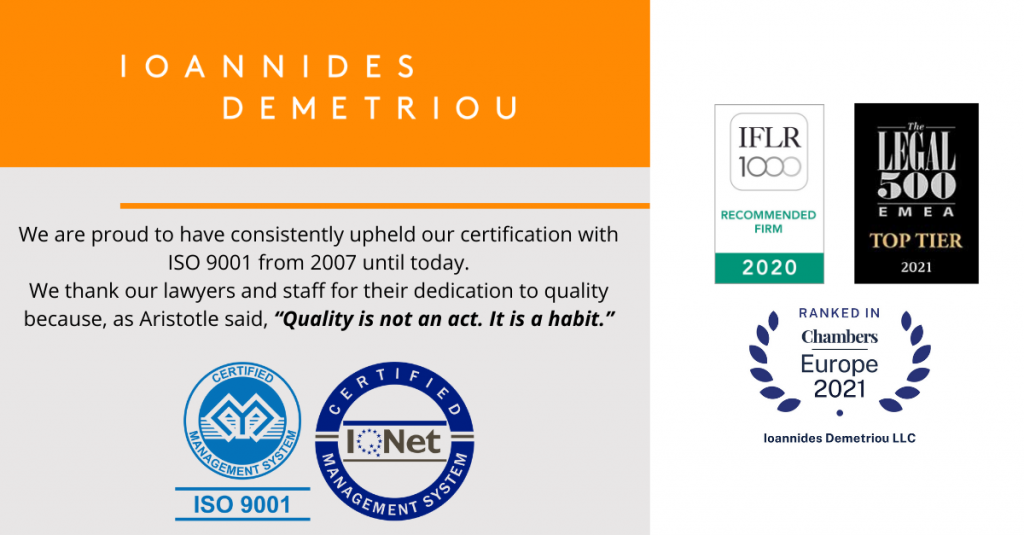The successful party to an arbitration often comes to the realisation that an award in their favour does not equate with justice being effectively served. This happens precisely because if the judgment debtor wishes, sometimes for multitude of valid or, more often than not, invalid reasons, to not honour the award they may choose to resist enforcement.
Cyprus ratified the New York Convention on the Recognition and Enforcement of Foreign Arbitral Awards of 1958 through law N.84/1979. Therefore, Cypriot Courts, almost exclusively, register and enforce foreign arbitral awards through the New York Convention (due to the large number of signatory countries to the New York Convention).
In representing a considerable number of both arbitral judgment creditors and arbitral judgment debtors before the Cypriot Courts I can readily state that Cyprus is definitely a “pro – enforcement” jurisdiction. At the same time, however, it is very clear that an applicant to the recognition and enforcement of an arbitral award needs to be extremely careful and thorough both in the drafting as well as in the submission of their application to the court for recognition and enforcement.
This meticulousness and caution is required precisely because there are a number of Cypriot Court judgments which have created a precedent of known “pitfalls” in the recognition and enforcement of arbitral awards. The pitfalls that I am referring to concern the “formal” requirements, i.e. the requirements as the form of the arbitral award, ancillary documentation and proofs that must submitted with the application as well the form to be followed in the application itself.
Pitfall 1: The applicant not “proving” that the country in which the foreign award was issued is a party to the New York Convention
Whether the country in which the award was issued has ratified the New York Convention is a question of jurisdiction for the Cypriot Courts since an application for recognition and enforcement of a foreign arbitral award will only be successful if the Cypriot Court actually has jurisdiction to hear the application. The starting point for assuming jurisdiction as far as the Cypriot Court is concerned is that both the country in which the award was issued and the Republic of Cyprus have ratified the New York Convention.
In the judgment in Application 32/2012, lntersputnik lnternational Organisation of Space Communications ν Alrena Investments Limited (19.1.2018) the President of the District Court of Limassol rejected an application for recognition and enforcement of a Russian arbitral award on the ground that the Applicant had not proved that the Russian Federation was a party to the New York Convention. The applicant had not mentioned anything about whether the Russian Federation was a party to the New York Convention and the Court decided that it was a matter which had to be specifically proved.
One would have suspected that the question of whether the Russian Federation is or is not a party to the New York Convention (for the record it most definitely is) is something that the court should have had judicial notice of or something that can be ascertained through a quick check on the internet. This was not, however, the opinion of the Court which in turn decided that since no positive proof of the ratification of the New York Convention by the Russian Federation had been presented by the applicant the Court could not assume jurisdiction, even if the respondents had not alleged the contrary.
Another Cypriot Judge which was of the same opinion was the President of the District Court of Nicosia in his judgment in Application 372/2019, Credit Agricole Bank (Ukraine) v Almira Holdings (Cyprus) Limited (16.9.2021). In that case the applicant had attached as an exhibit to their application a copy of the New York Convention website which contained a list of the ratifying countries. Again, the Cypriot Court rejected the application for recognition and enforcement, this time of a Ukrainian foreign arbitral award, and the reason was that, once again, the applicant had failed to provide appropriate and sufficient proof that both Ukraine and the Republic of Cyprus had ratified the New York Convention. The Court further went on the state that in order for a party to prove that the Republic of Cyprus had ratified a convention or bilateral treaty can be done in two ways, the first being the presentation of a certified copy of the Official Gazette of the Republic of Cyprus which states that the said treaty was ratified and the second being by presenting a certification (which is an essence a letter) by the Ministry of Foreign Affairs of the Republic of Cyprus certifying the both the country in which the award was issued and the Republic of Cyprus have indeed ratified the New York Convention.
Pitfall 2: Proving proper certification of signatures and seals on the face of the award
Article IV of the New York Convention contains a requirement for a “duly authenticated” original award or copy of the award. It is quite common for applications to be rejected on the grounds that the signature of the arbitral tribunal (whether it is one, three or more arbitrators) and/or the signature and/or seal of the representative of the arbitral forum has not been duly authenticated. Sometimes applicants also fall into the trap of considering the signature and seal of a representative of the arbitral forum or court to be equal in validity of an authentication or certification of the signatures of the arbitrators. In Cyprus this is not the case. In Application 2/2010, OOO Syntez v OOO Systcom (22.3.2013) the President of the District Court of Nicosia rejected the application for recognition and enforcement on the grounds that although it was evident on the face of the award that there were three signatures and a seal, with the applicant attesting that these were the signatures of the arbitral tribunal and the seal of an arbitral forum in Moscow, both the signatures and seal had not been “duly authenticated” with duly authenticated meaning “duly authenticated or duly certified in the manner required by the law of the country in which the award was made”.
It is thus clear that the applicant must have all signatures and seals certified by a person whose office and/or has the legal capacity to certify signatures and seals in the country in which the award has been issued. Who has the legal capacity to certify signatures and seals will of course depend on the jurisdiction in question.
Pitfall 3: Providing properly certified and attested translations
Another distinct problem area is that of providing translations of the arbitral award and the contract containing the arbitration clause in a manner acceptable to the Cypriot Courts. Although this may sound simple enough applicants may have their application rejected for a number of trivial reasons. The two most common ones are that a part, usually a small part, of a lengthy document has not been translated or that the person who has actually translated the document is not the one attesting to the affidavit of translation. What the applicant must do is employ a Certified “Sworn” Translator from the list kept by the Public Information Office (PIO) of certified by the Republic of Cyprus. This translator must translate all relevant documents into Greek and finally must also swear an affidavit attesting to the translations and attaching both a copy of the original document and the translation as an exhibit to the said affidavit. Then this affidavit is in turn attached to the application itself as an exhibit.
In the judgment in Application 4/2018, RWE Aktiengesellschaft v GBV Siebte Gesellschaft Fur Beteiligungs-verwaltung (14.12.2018), the President of the District Court of Limassol rejected an application for recognition and enforcement of an arbitral award on the grounds that the affidavit attesting to the translation was not sworn by the certified translator herself but by the manager of the translations company, who was in fact also a certified translator who had in fact attested that her employee (who was a certified translator) had conducted the translation and that she (the manager) had verified it. Despite the above the Cypriot Court decided that the fact that another person other than the person who had actually undertaken the translation had attested to the affidavit fell short of the requirement of providing certified translations.
Therefore, and by way of summary, in order to fulfill the formal requirements of Article IV of the New York Convention in an application for recognition and enforcement of a foreign arbitral award before a Cypriot Court the applicant must submit as exhibits the following:
(a) A Certified True Copy of the relevant arbitral award. It is not enough that the award is signed by the arbitral tribunal and/or signed and sealed by a representative of the arbitral forum (e.g the General Secretary of the LCIA). Both the signatures of the arbitral tribunal and the person signing and sealing on behalf of the arbitral forum must also be duly certified by a person who has the legal capacity to verify the authenticity of signatures and seals in the jurisdiction in which the award was issued. In most jurisdictions this person will be a Public Notary. Thereafter, the documents should be Apostilled. As a final failsafe, the applicant would be wise to include in their application a short expert opinion from a practicing lawyer in the jurisdiction in which the award was rendered, verifying that the person who has certified the signatures has the legal capacity to do so in the jurisdiction concerned.
(b) A True Copy of the agreement to arbitrate. Again, the most surefire way is to have the True Copy verified by a Public Notary and/or a person with the capacity to verify the authenticity of copies. As far as the Cypriot Courts are concerned, Cypriot Ambassadors and/or Consuls have the authority to verify the authenticity of contracts. Therefore, the best modus operandi is for the applicant to take the contract containing the arbitration clause to his nearest Cypriot embassy, High Commission or consular office and have to a copy authenticated by the Ambassador and/or Consul. Thereafter the copy should be sent to Cyprus where the applicants advocates can apply to the Ministry of Foreign affairs who will in turn certify the signature and/or seal of the Ambassador and/or Consul in question.
(c) Certified translations of the above-mentioned documents, including a translation of the wording of the Apostilles, by a certified “sworn” translator of the Republic of Cyprus from the PIO list (see above) who will take the documents, translate them and then swear an affidavit before the Cypriot Court attesting to the fact that he/she has translated the documents. This affidavit is then attached as an exhibit to the application. The applicant should ensure that the actual translator has to be the one attesting the relevant affidavit. It will be problematic for the application if another person, e.g the manager of the company undertaking the translation, swears an affidavit attesting to the fact that an employ of the company (who is a certified translator) undertook the translation as sometimes may occur if the translator is abroad or no longer in the employment of the translation company. In short, he who translates, attests as well.
(d) Certification that both the country in which the arbitral award was issued in and the Republic of Cyprus have ratified the New York Convention. Print-screens of the website of the New York Convention which lists the countries that have ratified it will simply not do. Again, the most certain way to provide this certification for the Cypriot Court is for the applicant’s advocate to apply to the Ministry of Foreign Affairs of the Republic of Cyprus which will in turn provide a letter confirming the ratification of the New York Convention for both the country in which the award was issued as well as the Republic of Cyprus and also state the relevant dates on which the New York Convention was ratified for each country. Thereafter this letter from the Ministry of Foreign Affairs should also be attached as an exhibit to the application.
Above I have detailed some relevant Cypriot caselaw in which many of the requirements of Article IV of the New York Convention were applied in absolute strictness but what the reader should take away from this is that despite the fact that Cyprus is a pro – enforcement jurisdiction it is not uncommon for some Cypriot Courts or judges to employ such strictness in applications for recognition and enforcement of foreign arbitral awards.
Have said that, in recent years a number of judges have adopted a far more practical, pragmatic and reasonable approach. There have been a number of examples in which Cypriot Courts have not entertained “empty” objections. For example, it is one thing to allege that the signature of the arbitrator has not been duly certified (an empty objection because it might very well be the actual signature of the arbitrator) and a totally different thing to alleged that the signature of the arbitrator has been forged (a positive objection).
In the judgment in Application 58/2018, The State of Montenegro v Ceac Holdings Ltd (30.4.2020), the District Court of Nicosia accepted a printout of the New York Convention website as proof the Austria had ratified the New York Convention and went on further to state the that it accepts it also because the was no testimony to the contrary from the part of Respondent (i.e. testimony that Austria had not actually ratified the New York Convention). In the same judgment the Court also mentioned that the originality of the award, which was not in the Greek language, had not been disputed by the respondents. In essence the Court in the above application adopted a “if you have evidence to the contrary of what the applicant is alleging then show it me” approach. An important part of the judgment is also the fact that the Court clearly states that if it there were omissions in the translations and the Court had wanted those parts to be translated then it could have asked the applicant to translate them of its own volition. This approach is beginning to take hold with a number of District Court judges in recent years but has yet to be tested in the Supreme Court, of which a number of the judges who have adopted the much stricter approach are now members. With that in mind, the slightly cumbersome and evidentially demanding “better safe than sorry” method I have detailed above is definitely the best way to approach an application for recognition and enforcement of a foreign arbitral award.







